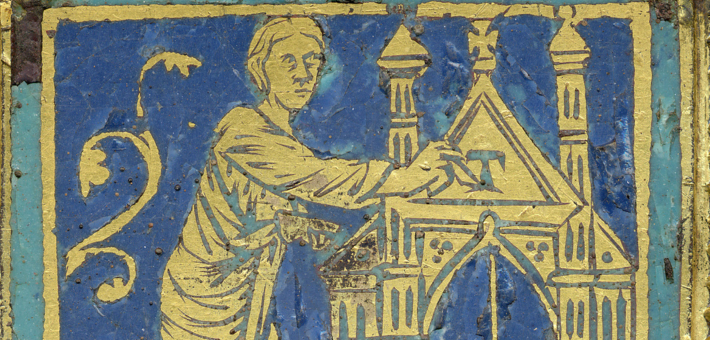Commentary on Exodus 12:1-13; 13:1-8
Chapters 12 and 13 in the book of Exodus narrate the climax of God’s showdown with Pharaoh and the start of the exodus; they tell of the last of the plagues and the beginning of the people’s march toward Canaan (see 12:51; 13:18). These two chapters are mostly non-narrative. They mediate instruction: first from the Lord to Moses and Aaron (12:1), then from Moses to the elders (12:21). Chapter 13 repeats this two-step transfer: the Lord to Moses in 13:1 and Moses to the people in 13:3.1 The chapters even refer to their contents with the word torah, which means “instruction” (12:49; 13:9). They instruct the Israelites how to keep the Passover.
Christian preaching often treats these Passover instructions as a prefiguration of Christ. These Exodus chapters, it is thought, foreshadow Christ’s identity and work. He is the ultimate Passover Lamb, sacrificed for us (1 Corinthians 5:7b). His blood is like that of an unblemished lamb (1 Peter 1:19), and as such, it protects believers from destruction. If instruction is still available to Christians from these chapters, it is, on this approach to preaching, christological. Perhaps in a secondary sense, it is moral. After all, Paul exhorts: “Let us celebrate the feast, not with the old yeast, the yeast of malice and evil, but with the unleavened bread of sincerity and truth” (1 Corinthians 5:8).
But it is also possible for Christian preaching to engage these chapters as instruction in a more practical fashion—not to deny their christological or moral value, but to attend to them as an education in remembrance. The discipline of remembrance takes three forms, corresponding to the three interrelated practices that Exodus 12–13 regulates.
First, there is the feast of Passover. The text identifies this observance as a celebration or festival to the Lord (12:14b). Like any feast, it centers on eating together. The contents of the meal matter: a flawless lamb is the centerpiece, accompanied by unleavened bread and bitter herbs. But the company matters as well: “It should be eaten in one house” (12:46), meaning that each household hosts their own meal, and if a family unit is too small, they should join a larger household. Above all, the feast stages remembrance.
As chapter 12 says: “This day will be a day of remembering for you” (12:14). What Passover remembers is God’s mercy. It rehearses the plague of the firstborn (12:13b), when the destroying angel struck down the first offspring of humans and animals alike, but “God spared our houses” (12:27). Christian preaching can commend the discipline of remembrance that celebrates God’s past, decisive mercies.
Second, there is the feast of Unleavened Bread. Like the Passover observance to which it is conjoined, the feast of Unleavened Bread is a celebration or festival to the Lord (12:17; 13:6). But this designation is somewhat paradoxical, since a kind of fasting is at its heart. Exodus also calls it a “night of vigil” (12:42), which aligns more closely with its dynamic of going without. For seven days, the Israelites are to remove yeast from their house and to eat bread characterized by its lack of fermentation. In demonstration of this lack, the book of Deuteronomy refers to matzah as “the bread of affliction” or, alternately translated, “the bread of the poor” (16:3).
Preparing and eating such bread mimics the haste and want of the first, exodus generation. They didn’t have time to wait for yeast to rise but needed to leave Egypt quickly (Exodus 12:34, 39). Eating Unleavened Bread makes present-day bodies feel again the hardship out of which God brought the ancestors. This is meant to contrast with the subsequent plenty of God’s provision: chapter 13 highlights the contrast between the yeastless bread of the festival and the land of milk and honey (verses 5b–7). If Passover celebrates and relives God’s past mercy, Unleavened Bread celebrates and relives past scarcity. Christian preaching can commend the discipline of remembrance that keeps contact with afflictions out of which God has led us.
Third, there is the consecration of the firstborn (13:11–16). Moses commands the people to “set apart to the LORD all that first opens the womb” (13:12a). All firstborn males already belong to the Lord (13:12b); consecration flows from prior obligation. Moses grounds this obligation in the Passover event. It is because of the death of the firstborn in Egypt that the firstborn of humans or of animals are owed to the Lord (compare Numbers 3:11–13; 8:13–26).
But, in contrast to a lot of Christian preaching and teaching, the nature of the ensuing obligation does not concern death. It is not as if the ransom Moses prescribes exempts the firstborn human or animal from slaughter to which they would otherwise be bound. Rather, the obligation is to lifelong work and service.
This can be seen from the substitution of the Levites later in the book of Numbers. The Levites serve God in the Tent of Meeting in place of all the firstborn from other tribes of Israel (Numbers 8:18). Andrew Rillera writes: “We learn from this that the firstborns were supposed to be given to God as permanent sanctuary workers, but now the tribe of Levi substitutes for all the firstborns.”2 The ransom Moses prescribes “buy[s] back their workload.”3 In other words, God’s past mercy to spare the firstborn generates an obligation of later firstborn lives and labor.
Christian preaching can commend the discipline of remembrance that stirs up a grateful obligation. We love because God first loved us. We consecrate our lives, including our most cherished possessions, because God first protected our life and because our most cherished possessions are God’s gifts in the first place.
Notes
- Brevard S. Childs, The Book of Exodus: A Critical, Theological Commentary, OTL (Philadelphia: Westminster, 1974), 202–204.
- Andrew Remington Rillera, Lamb of the Free: Recovering the Varied Sacrificial Understandings of Jesus’s Death (Eugene, OR: Cascade, 2024), 48.
- Rillera, Lamb of the Free, 48.
PRAYER OF THE DAY
Lord God of grace and liberty,
On the night of the Passover the sacrificed lamb became a sign of freedom and you freed the people of Israel from slavery in Egypt. In Jesus, you sacrificed your son as a gift, thereby freeing all humanity from sin and death. Help us live into this new life, teaching us to serve you in faithfulness as you have served us. To you we offer our gratefulness in the name of the one who turned slavery into new life, Jesus Christ, our Lord. Amen.
HYMNS
O living bread from heaven ELW 542
Here is bread ELW 483
As we gather at your table ELW 522, NCH 332
Bless now, O God, the journey ELW 326
CHORAL
Here I am, Lord, Daniel L. Schutte (Augsburg Fortress, Publisher)


September 29, 2024